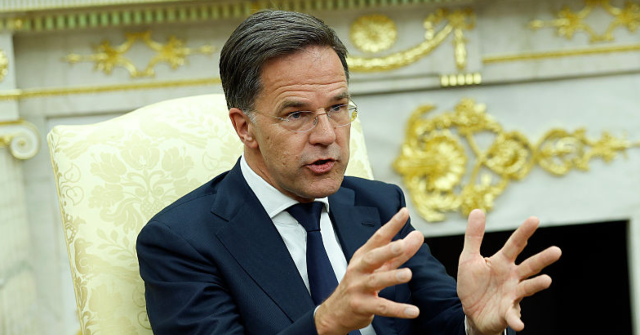North Atlantic Treaty Organization (NATO) Secretary-General Mark Rutte on Wednesday warned Brazil, China, India, and other heavy buyers of Russian oil they could face stiff secondary sanctions if they keep doing business with Moscow.
“My encouragement to these three countries, particularly is, if you live now in Beijing, or in Delhi, or you are the president of Brazil, you might want to take a look into this, because this might hit you very hard,” Rutte told reporters after meeting with President Donald Trump and U.S. lawmakers in Washington, D.C.
“So please make the phone call to Vladimir Putin and tell him that he has to get serious about peace talks, because otherwise this will slam back on Brazil, on India and on China in a massive way,” he said.
Rutte was referring to President Donald Trump’s threat of “biting” and “very, very powerful” secondary tariffs on Russia if President Vladimir Putin does not make a peace deal in Ukraine within 50 days.
“I’m disappointed in President Putin, because I thought we would have had a deal two months ago,” Trump said after meeting with Rutte in the Oval Office on Monday.
Secondary tariffs would be a significant escalation over direct sanctions against Russia, which have been in place since Russia invaded Ukraine in February 2022. Russia was able to mitigate the impact of those sanctions by shifting its oil export business to eager buyers in China and India, who have a voracious appetite for fossil fuels to power their industrial growth.
Secondary tariffs would strike not the Russians, but countries that do business with Russia, adding a tremendous hazard that would make discounted Russian oil seem much less attractive. Trump mentioned 100 percent secondary tariffs, but there is currently a bill in the Senate that would make it 500 percent.
This would be a bold move that affects a fairly long list of nations. The top buyers of Russian energy products include South Korea, Taiwan, Japan, and Turkey, which is a member of NATO. Some countries are additionally reliant upon Russian exports besides oil, coal, and gas. Brazil, for example, buys a great deal of fertilizer from Russian suppliers.
India, which is currently involved in high-stakes final negotiations for a trade deal with Trump to avoid high tariffs, will not like being told to go cold turkey on Russian oil. The editors of India Today were apoplectic at Rutte for threatening India’s energy supply.
“This provocative statement directed at sovereign nations, including India, coming from the head of a military alliance, instantly raises questions about diplomatic overreach and propriety,” the editors railed.
The editorial also blasted Rutte and Trump for “doublespeak” because “the hammer never seems to fall on European nations, even though they’re still buying Russian oil themselves.”
“In the third year of the Russia-Ukraine War, Europe’s fossil fuel imports from Moscow dropped by just 1% year-on-year. So, who exactly needs the lecture on responsible trading?” India Today snarled.
The editorial tartly reminded Rutte that India is not a member of NATO, so he has no authority to dictate its trade policy. Turkey is a member of NATO, and will probably be no more receptive than India to having its trade policy dictated by Rutte.
The editors also complained about Trump criticizing BRICS, the China-led economic bloc India was a founding member of, while favoring Western trade alliances, and they were beside themselves at Rutte’s assertion that BRICS members have a special responsibility to rein in Putin’s murderous rampage.
“Why should India, China, or Brazil be the ones calling Putin? Did Trump’s battering of Zelenskyy not work last time, or is the ‘daddy’s’ desperation to grab a Nobel Peace Prize getting more intense?” they sneered, riffing on Rutte’s praise of Trump as the geopolitical “daddy” who ended the 12-Day War between Iran and Israel.
India would likely be the Russian business partner with the least hostile response to secondary tariffs. The Chinese Foreign Ministry angrily rejected Rutte’s remarks on Wednesday.
“Let me reiterate that China always believes that dialogue and negotiation is the only viable way out of the crisis. China firmly opposes any illicit unilateral sanctions and long-arm jurisdiction. Tariff wars have no winners. Coercion and pressuring will lead nowhere,” said foreign ministry spokesman Lin Jian.
Russian officials scoffed at the secondary tariff threat, confident that India and China would never go along with the plan, and even if they did Russia would find other ways to protect its income streams.
“Trump issued a theatrical ultimatum to the Kremlin. The world shuddered, expecting the consequences. Russia didn’t care,” taunted Dmitry Medvedev, deputy chair of Russia’s Security Council.
“Russia will certainly take the threats into account, but this will not affect the course and goals of the SVO,” said prominent lawmaker Sergey Mironov. SVO or “special military operation” is Russia’s preferred euphemism for its brutal invasion of Ukraine.
“We are coping, I have no doubt that we will cope,” shrugged Russian Foreign Minister Sergey Lavrov.
Read the full article here


